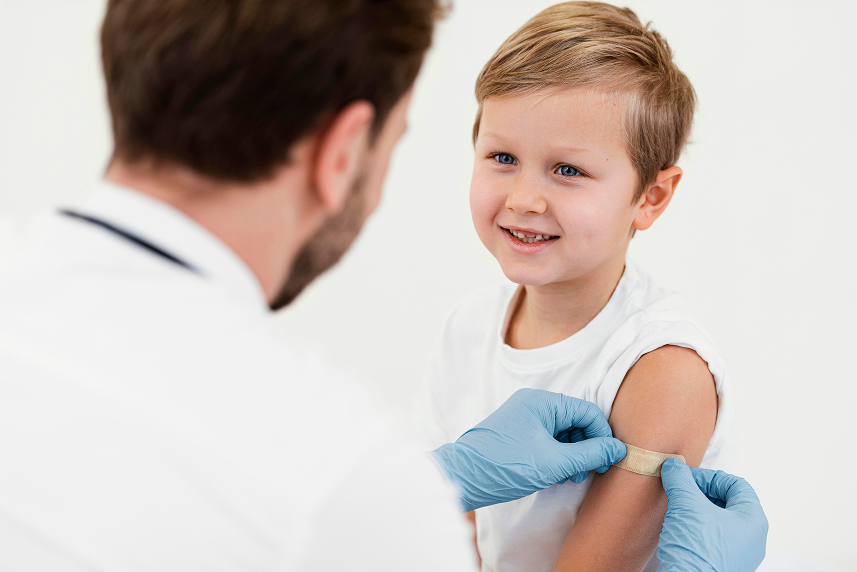Vaccines are one of the most important tools we have to protect children from dangerous diseases. They help the body build a strong defense system called immunity. Because of vaccines, many deadly illnesses have been reduced or even removed in many parts of the world.
As a parent, you want to keep your child healthy and safe. One of the best ways to do this is by following the recommended vaccination schedule. In this blog, we’ll talk about the essential vaccines your child should get, why they are needed, and when they are usually given.
Why Are Vaccines Important?
First of all, vaccines save lives. They help prevent serious illnesses like measles, polio, and hepatitis. They also stop the spread of disease to others in your family and community.
Vaccines are tested and proven to be safe. They are given in small amounts to train your child’s immune system to fight off real infections in the future.
In other words, they prepare the body in advance. They prepare the body for danger. They prepare the body to fight.
Key Vaccines for Children
Here is a list of the most common and essential vaccines recommended for children:
1. BCG (Bacillus Calmette–Guérin)
- What it protects against: Tuberculosis (TB)
- When given: At birth or shortly after
- TB is a serious lung infection, and this vaccine helps prevent the most severe types in young children.
2. Hepatitis B Vaccine
- What it protects against: Hepatitis B, a liver infection
- When given: Within 24 hours after birth, and then at later intervals
- This disease can spread through blood or body fluids. Early protection is very important.
3. Polio Vaccine
- What it protects against: Polio, a disease that can cause paralysis
- When given: At 6, 10, and 14 weeks, and then booster doses
- This vaccine is very effective and has helped almost wipe out polio in many countries.
4. DTP Vaccine (Diphtheria, Tetanus, Pertussis)
- What it protects against: Three serious diseases—diphtheria (throat infection), tetanus (muscle spasms), and pertussis (whooping cough)
- When given: At 6, 10, and 14 weeks, with booster shots later
- This combination vaccine is very important for protecting your child’s breathing and overall health.
5. Hib Vaccine (Haemophilus influenzae type b)
- What it protects against: A type of bacteria that can cause brain infections (meningitis) and pneumonia
- When given: Often combined with DTP and other vaccines
- Young children are most at risk, so this early protection matters a lot.
6. Rotavirus Vaccine
- What it protects against: Rotavirus, which causes severe diarrhea and vomiting
- When given: At 6 and 10 weeks (or as advised)
- Dehydration from diarrhea can be dangerous in babies, so this vaccine is life-saving.
7. Pneumococcal Vaccine (PCV)
- What it protects against: Infections of the lungs, blood, and brain caused by pneumococcal bacteria
- When given: At 6, 10, and 14 weeks (or as per your local schedule)
- This vaccine helps reduce cases of pneumonia and meningitis in young children.
8. MMR Vaccine (Measles, Mumps, Rubella)
- What it protects against: Three viral diseases—measles (rash and fever), mumps (swollen cheeks), and rubella (German measles)
- When given: Around 9 to 12 months, with a booster later
- These diseases spread easily and can lead to serious complications without the vaccine.
9. Typhoid Vaccine
- What it protects against: Typhoid fever, a disease caused by contaminated food or water
- When given: Often after 9 months of age
- It’s especially important in places where typhoid is common.
10. Influenza Vaccine (Flu Shot)
- What it protects against: Seasonal flu viruses
- When given: Once a year, starting at 6 months of age
- This vaccine is updated every year to match new flu types.
What If a Vaccine Is Missed?
Sometimes children miss a vaccine dose due to illness or travel. Don’t worry—just talk to your pediatrician. They can create a catch-up schedule to help your child get back on track.
Delaying vaccines may increase the risk of getting sick, but catching up is always better than skipping them completely.
Are There Side Effects?
Yes, some children may have mild side effects like:
- Fever
- Swelling at the injection spot
- Fussiness or sleepiness
These are normal and usually go away in a day or two. Serious side effects are very rare. Always tell your doctor if you notice anything unusual.
Tips for Parents
To make vaccination easier:
- Bring your child’s vaccination card to every visit.
- Comfort your child during and after the shot.
- Dress them in loose clothes for easy access to their arm or thigh.
- Give lots of cuddles and fluids after the visit.
Remember to ask questions if you’re unsure. Your doctor is there to help.
Final Thoughts
In short, vaccines are a powerful way to protect your child from serious illness. By following the vaccination schedule, you’re giving your child a healthy start in life. They will be ready to face the world with a strong immune system.
Always check with your pediatrician if you have questions or concerns. Together, you can make the best decisions for your child’s health—today and in the future.

